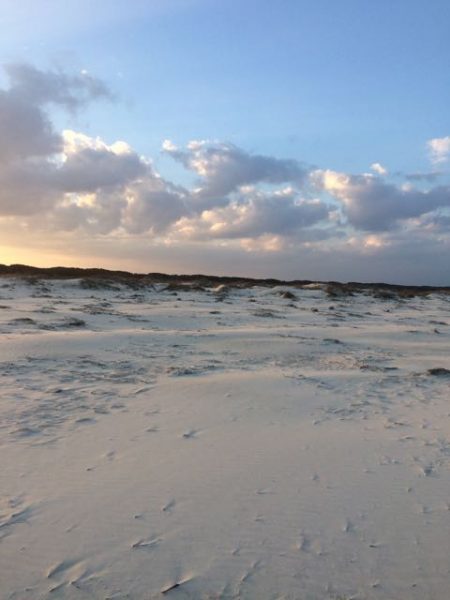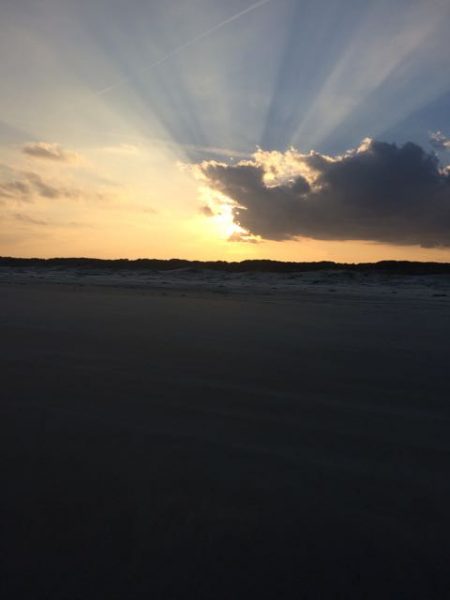The Nature Cure
 I’m just back from a few nights around a campfire with great friends. We were on a late winter island getaway. One remarkable moment after another— so many I tried to make a list. When I read it out loud it sounded like a poem. “sea grass, dunes, sugar sand, wet sugar sand, sea”.
I’m just back from a few nights around a campfire with great friends. We were on a late winter island getaway. One remarkable moment after another— so many I tried to make a list. When I read it out loud it sounded like a poem. “sea grass, dunes, sugar sand, wet sugar sand, sea”.
One scrap of conversation sticks out in memory: my friend Janet’s comment that she felt like a kid getting to play outside til dark. We watched armadillos and possums cross paths with squirrels and raccoons, and the light’s thousand ways of filtering through the live oaks during the various times of day. The understory was all young palm trees and cardinals played among them. Some crows worked the higher regions.

One of our days we rode bikes partway up the island, along the beach, to visit an abandoned mansion from the gilded age. When we got there no one was around except one docent who was having a conversation with a woman in pigtails and a wide-brimmed hat, white fisherman’s boots and large comfortable camouflage pants. She had created a kind of uniform with pockets the right size, where they were most needed, salvaged from other garments. She had a kind of pencil holder attached to her hat, decorated with a bird’s feather, ready at a moment’s notice . She reminded me of us— Jim with his necklace that has a lightweight knife on it, so he never has to search for it, or the bracelets he made us of woven cord, so if the need arises we always have 8’ of cord with us. Her uniform served her purposes.
Janet struck up a conversation with this woman, since she was in the middle of reading the book about her life and recognized her immediately. She was, in fact, the person dubbed “The Wildest Woman in America” in the subtitle of Will Harlan’s book about Cumberland Island, Untamed. Carol Ruckdeschel is, at the very least, one of the most interesting women in America. She talked about her daily observations of the island’s three scattered bald eagle nests, but she is more famous for her work in defense of the sea turtle, and her influence in having the island protected as a National Park. Carol is a self-taught biologist of some reknown, and has devoted her life to marine conservation, and the conservation of Cumberland Island.
The thing that struck me most vividly in this meeting was her eyes. They were lit from within. Make of that what you will. A life of selflessness and connection to the wild world seemed to have served her soul very well indeed. She had a kind of indelible human beauty. Janet and I were both mesmerized. She was annoyed by any attempt to discuss her life, and urged us more than once to go to wildcumberland.org if we wanted to connect in positive ways to the island. Janet and I concurred later that we had both sensed that we should not ask her for a photograph. She clearly wanted only to promote her goals of conservation, and not herself. It was an extraordinary life event I will capture only with words, while hoping to pass along the core message… go to wildcumberland.org.

We had backpacked on my first trip to the island, hiking a few miles before pitching our tents, but this time we modified the plan to make it simpler for a larger group. We camped close to the ferry landing so we were able to haul larger tents, more bulky groceries, and things like camp chairs. I hauled a bag of art supplies down to the island, but really the work of art was done in resting my hands and letting my eyes and mind play. There was one brilliant vignette after another. When I returned home the work in progress in the studio took on a new clarity. It’s so strange how that happens. I could suddenly see, in every painting of the five I’m working on, the flaw, the weak spot, the potential for flight.

We set up a really comfortable camp. For me it was a chance to experiment with the mechanics of going down later for a week by myself to paint. We watched the sun pass over. The moon was huge, just past full. The stars looked like sequins between the limbs of the live oaks… the image I’m most anxious to play with. We had bonfires with live oak and cedar. The sea was the background noise— just the other side of a series of tall dunes.
We told stories from childhood and realized with a little shock, how much of another time those stories were. Mostly, the whole time I was in those woods I felt a huge sense of relief. It was such a blessing to leave the pettiness of life in America behind, and steep in the density of the real and raw world. I found myself content, less anxious, less busy reaching to satisfy some kind of need. Just calm and glad.
I’d drop behind the crowd hiking or biking and find myself with word after word bubbling up in some litany of thanksgiving. I return a little bit healed, a little bit encouraged, loved back into breathing by something bigger than I am.


Recent Comments